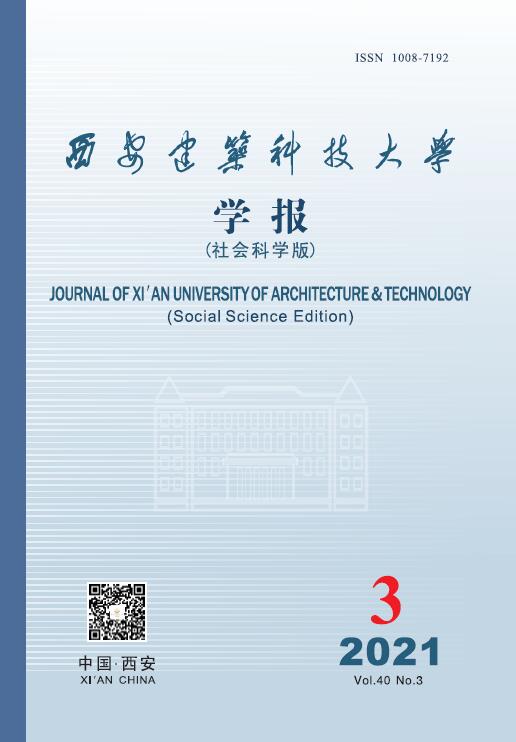儒学作为中国古代重要的正统思想,对中国古典园林影响深远,无论从居住环境的园林化倾向还是山水审美主张,都由中国文人潜移默化地改变和影响着中国古典园林的建园活动,同时儒学所提倡的“比道”“比德”“比兴”和“中和”“中庸”等主张,也都不同程度地给古典园林注入思想的活力。以下试图从居住体验、审美主张、审美境界、园林美学和园林意境几个方面,阐述儒学思想对中国古典园林的深远影响。
3.1 “居移气养移体”的居住体验
孔子对居住环境十分重视,多次提及居住环境对人的意义,所谓“里仁为美”④。《札记》中“仲尼燕居”和“孔子闲居”两章,大量文字描述“退朝而处”的“各得其宜”。孟子也提出“居移气,养移体,大哉居乎”⑤。这种思想很大程度上促进了中国古典园林的繁荣。园林正是“居移气养移体”的重要场所,也是有着更深层次的精神目的和追求的场所。自古以来帝王无不细心营造宫苑园林,景色优美,功能庞杂,从此帝王园居成癖。故宫之内,就有多个内苑,乾隆花园、慈宁宫花园、宁寿宫花园。江南文人亦大肆兴修土木,居住、喝茶、赏花、会友、弹琴、抚筝,议论政事,月下独酌,好不风雅。而自宋室南迁,江南造园之风更盛。明御史王献臣罢官返乡,因元代大宏寺遗址建拙政园(图3),从此逍遥自得,享闲居之乐。清末湖州按察使沈秉成因病携妻归隐于苏州,购得涉园废址,建成耦园,从此夫唱妇随,只羡鸳鸯不羡仙。明万历年间太仆寺少卿徐泰时建造东园,后清乾隆末年书画家刘恕在此基础上建造寒碧山庄,到了清代同治年间,园子被盛康买下,传给了他的长子晚清著名的官商盛宣怀,改名留园,享受不出城郭而获山林之趣的居住体验。不仅文人士大夫,商人阶层也十分重视居住环境,盐商汪竹铭,汪氏小苑成为了他居住会客、畅谈生意的绝佳场所。中国园林丰富了中国人的居住体验。
3.2 仁山智水与卷石勺水的审美主张
在中国乃至世界,孔子都是最早提出山水审美主张的先驱⑥。朱熹在《论语集注》中解释:“知者达于事理而周流无滞,有似于水,故乐水; 仁者安于义理而厚重不迁,有似于山,故乐山。”由此可见,山和水在儒学眼中具有优良的品格,按现在的观点,这是一种审美移情,在这样的思想指导下,中国古典园林奠定了宏大的山水审美观,几乎无园不山,无园不水。北方皇家园林,以其绝对的实力,包罗原山真湖,或者大规模挖湖堆山,北京西郊三山五园,含香山、玉泉山、万寿山、昆明湖等。而江南,大如拙政园(图4),水面占了全园面积一半以上,刻意营造东海的浩渺广阔,堆筑蓬莱、方丈、瀛洲三座海中仙山,集中体现了儒家山水审美主张; 再如网师园,也是一个以水为主景的园林,其他景致围绕水面展开,表达渔隐的愿望; 狮子林、环秀山庄等则以叠山著称,山形险峻,山路岖曲; 个园的四季假山更是写意假山中的一绝; 至于寄畅园更是巧妙利用了二泉的水,形成各种水的形态,同时利用惠山的龙气,堆叠案墩假山,蜿蜒入园,成为余脉。而对于山水的审美,《中庸》这部儒学经典中进一步提出“卷石勺水”的概念,从根本上改变了园林自然美的审美方式,使中国古典园林摆脱了对自然山水原型的简单模拟和照搬,通过艺术的高度概括来再现自然山水之美,唐宋之后,繁荣发展的江南私家园林开始寻求中隐的精神避所,“一峰则太华千寻,一勺则江湖万里”,寄畅园的八音涧,引二泉之水,穿流于假山之间,有自然之态,又不拘自然之俗,水流潺潺,犹如八种乐器和鸣,遐思不已。
3.3 山水比道和君子比德的审美境界
孔子儒学对自然审美的另一个突出贡献在于山水比道和君子比德。所谓道,是宇宙生命的真谛,是天道、是人道; 所谓德,是道德,是为目标奋斗所必须依据的品德。《论语》中提出了孔子著名的“志于道,据于德,依于仁,游于艺”观点,这一思想影响了中国古典园林的思想境界。首先,比道是高层次的审美境界,孔子在川观水,感慨的却是“逝者如斯夫,不舍昼夜”[6]327。山水,在园林中的地位不限于山水,是一种道的象征,无锡寄畅园,取自王羲之《答许椽》诗“取欢仁智乐,寄畅山水阴”之意,表达寄情山水的畅快,锦汇漪旁的知鱼槛向世人讲述了庄子和惠子游于濠梁之上,感悟人生,提出的“子非鱼,焉知鱼之乐”故事,告诉人们不要枉自揣度他人; 《孟子·离娄上》记载,“沧浪之水清兮,可以濯我缨,沧浪之水浊兮,可以濯我足”,乃“自取之乐”也,传达了一种不与世俗同流合污的洁身自好,沧浪亭即取名于此。拙政园小沧浪、网师园濯缨水阁都反映了这种善恶清浊之道。而在比德中,美是道德的象征,自然景物是道德、品格的象征和符号。园林中的一切要素景致,无不关乎君子品德心性,是其外在表现。在此影响下,江南古典园林在园林植物的选择上尤其呈现一种普遍的君子比德的审美取向。竹子,因其虚心而有节,几乎无园不竹。更有甚者,个园(图5)的个字就是对竹叶的模拟。个园以竹命名,体现了“君子比德”思想的典型特征,表现了园主以竹之“虚心有节”为准则的精神,反映了园主对于竹的热爱; 荷花,出淤泥而不染; 松竹梅,岁寒三友; 梅兰竹菊,花中四君子; 岁寒,然后知松柏之后调也。均出于君子比德的审美目的,影响了植物景观的呈现面貌。不仅植物,在其他造园要素的选择与营建上,亦体现这一特征。例如园林铺装图案的选择,体现君子情怀和谐音借喻文化; 建园石材的选取,取太湖石的玲珑剔透,黄石的遒劲质朴之意,等等。
3.4 中庸之道、中和之美之与园林美学
孔子主张“中庸”之道,他提出 “无可无不可”⑦,孟子则提出“穷则独善其身,达则兼济天下”⑧,这种思想直接左右了中国文人阶层入、仕、出、隐的态度,中隐思想的繁盛,园林则成为中隐的精神避所。在美学上的表现,则是“中和之美”[8]28-45。这种中和之美,也必然包括精神伦理道德的向善追求。《国语·楚语上》评价,“夫美也者,上下、内外、大小、远近皆无害焉,故曰美”。所有关注形式美原则的艺术,包括园林艺术,离不开中和之美的本质,要求协调各对立因素以达到多样统一的和谐。在此思想引导下的中国古典园林在造园艺术上,极为讲究,处处体现以和为美。将各种对立因素和谐统一起来,追求含蓄之美,这形成了中国园林的内在神韵。园林布局虚实相间,疏密得当; 园林尺度,精而体宜,避免夸张之势; 园林建筑,讲究主从得当,各司其职; 园林植物,俯仰得当,聚散得体,相配合宜。正是由于这种思想,中国园林从来都没有尺度巨大的建筑,即使北方皇家园林,如颐和园,最大体量的佛香阁,也是借山势和台基才形成了全园的主景。再看江南寄畅园,围绕锦汇漪,以嘉树堂为主景,先月榭与之遥相呼应,又有知鱼槛与鹤步滩相对,同时郁盘亭廊、七星桥、涵碧亭及清御廊等绕水而构,与假山相映成趣(图6)。江南园林寄畅园,围绕锦汇漪,协调各因素以达到多样统一的和谐,体现中和之美。而江南较大的园林,如拙政园,虽然园景被分割成东中西三部分,亦以水面相联系,步移景异,协调共生,同在中园的几处大型景点,如远香堂、玉兰堂、香洲、听雨轩等,假借地形,互相呼应,彼此成就。
3.5 虚静比兴与园林意境
普遍的认识上,认为中国禅宗的思想促成了园林意境的发展。其实中国哲学家无论儒道,都以对事物的直接领悟作为他们哲学的出发点[9]3-13。而玄学本体论流派的哲学思辨使儒道哲学由粗糙走向精致[10]。正是这种转变,促成了景与情的交融,以及意境的生成。孔子提出不少关于静虚的言论,“仁者静” “默而识之”。所谓空灵,即是忘我,是静观,是虚静[11]5-6。抛开一切杂念,以纯净的心灵感悟世界。《诗经》提出诗歌六义,风雅颂,赋比兴。以物喻物谓之比,借物起兴谓之兴⑨。孔子最先引出诗性思维模式,“诗言志”“兴于诗”,简单地理解就是要论述一件事,先用另一件事引入,这就是比兴,让受众通过一个熟悉的事物获得一个基本认知,有助于理解。江南古典园林中通过比兴的方式,让看似无关的事物建立某种联系,完成诗画意境,通过静虚来感悟诗画意境,从而达到情与景的交融。一花一木,一山一石,无不关情(图7),网师园,以渔隐的方式,有限空间内通过水面静虚来感悟诗画意境,从而达到情与景的交融,闲庭信步,面对一池碧水,感叹人间繁华; 拙政园与谁同坐轩,与谁同坐,明月清风与我,寂寥间,于蕉窗听雨,慨叹残荷落日,得意时,于鸢厅赏菊,喜吟梧桐栖凤; 狮子林,更是儒学和禅宗思想相碰撞的佳作,感悟程门立雪,再现一苇渡江。









